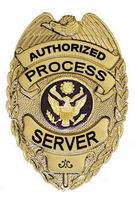What Is A Process Server And What Do They Do?
A registered process server is an individual that is certified and trained to provide (serve) legal documents to people and companies, known as defendants or parties.
 When a criminal or civil case goes to court, the lawyers will alert the parties included through legal documents. The process server, upon getting the papers from the attorney, then serve the papers to the defendant. When referring to registered process servers, these are usually servers that are registered to serve within a specific county or location of their state, having actually been trained to do so.
When a criminal or civil case goes to court, the lawyers will alert the parties included through legal documents. The process server, upon getting the papers from the attorney, then serve the papers to the defendant. When referring to registered process servers, these are usually servers that are registered to serve within a specific county or location of their state, having actually been trained to do so.
Becoming a process server is a straightforward process. Most states require servers to be trained and accredited by either a lawyer or an authorized veteran server. Each state has a process server association or state board that regulates the laws for process for that state and have a listing of accepted training and courses. State laws will determine the degree of criminal background one needs to pass in order to serve papers.
The primary duty of a process server is to deliver notifications of a pending case to the appropriate party or parties. Process servers are also hired to do other tasks associated with service, like surveillance or performing background checks. It’s up to the individual server whether or not to provide these services.
Though cases differ, the attorneys representing each side will provide the individual’s identity and address where they believe they can be located for delivery. After the case has been filed in court, the lawyers will provide a court copy of the case with the parties to be notified to the server. The server will then attempt to deliver the paperwork to the individual they are directed to. The sort of case determines the mode and length of delivery.
Citations and petitions tend to be regulated and are permitted up to a couple of months to locate and serve the papers. Subpoenas to testify and produce information generally have a smaller window for completion. Temporary restraining orders and writs of garnishment and execution generally require service within three business days due to the immediate nature of these kinds of cases.
If you’re interested in becoming a registered Orange County process server, learn the regulations and requirements for California and study the laws of civil procedure. Serving legal documents is not the most glamorous job, but it is constantly in demand and filings of new civil cases grow in number every year.






